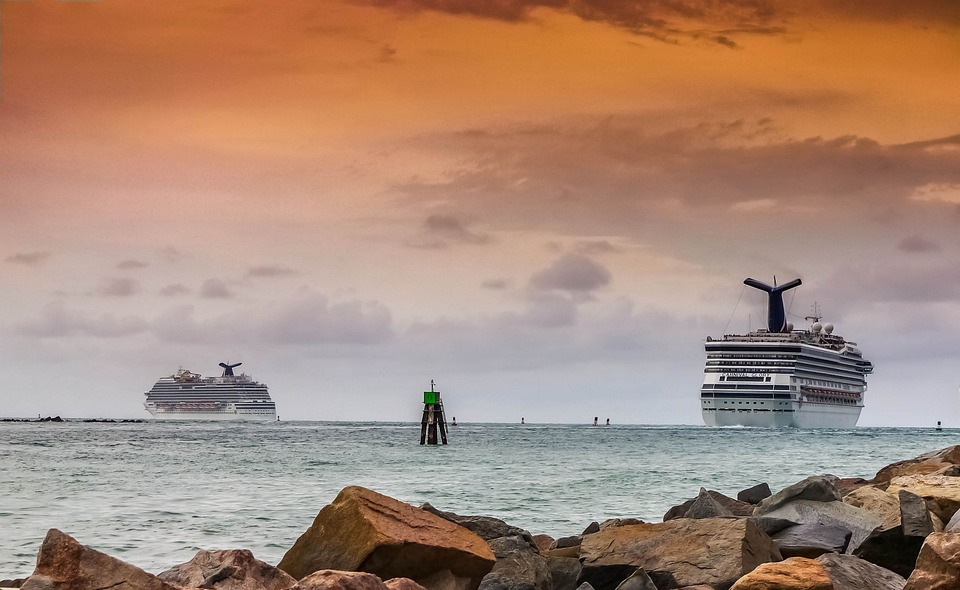It’s getting that time of year when North Americans start heading for warmer locales. The simple need to get out of town need not take passengers out of their comfort zone. Trips out on the high seas can be relatively inexpensive to somewhat exotic places. But no matter where you go, high profile traveling needs to be considered by passengers.

Ship Report Card
To start with, ships get graded just like everything else. If you want to know which ship is going to give the best experience, read some online reviews. It might also be prudent to see which carriers share your own values. Friends of the Earth has an environmental footprint report card for cruise lines and individual ships, grading aspects of sewage treatment and air and water pollution. Perhaps not surprisingly, most cruise ships get a failing grade on environmental impact. CDC also performs routine inspections of cruise ships to reveal faults found mostly in food safety, but also in other things such as onboard safety of passengers.
Hidden Costs
Traditionally, cruise ships have been all-inclusive, meaning that the room, meals and entertainment are included in the initial fare. These days, much of the entertainment is separate so that passengers can pick and choose what they want to do. This also is a way that cruise lines have established lower prices for fares. To be sure, there are numerous hidden charges awaiting on ships for things like spas, drinks, onshore activities, souvenirs, laundry, tipping and other things. Different cruise ships also have different policies on how these things are purchased. Some don’t accept cash and run a card that must be paid at the end of the trip. This can help run up a rather hefty bill if one does not stick to a budget.
Don’t Trust People
You probably have heard this before, but cruise ships are like mini-cities. And, like cities, there are all kinds of bad seeds waiting to take advantage of people. Cruises have been mostly for people that are fairly well-to-do, so other passengers and sometimes even crew members can get ideas. If you’re gambling or drinking on a ship, expect the odds of being targeted to be somewhat higher than normal. Also, the flashier people dress or louder they are among others could make for great targets.
Ships have safes in the management’s office that can keep valuables safe. Each room generally has its own safe, but the onus is on each person to remember how to get into the safe. If you can’t get into the safe when it is time to deboard, you will likely find it difficult to find staff to override the code and get into it quickly and may have to rely on the contents being mailed later. The best advice is to dress simply and conservatively and don’t take things that you can’t afford to lose.
Land Excursions
Even moreso that onboard the ship, it is prudent to watch yourself off the ship. As much as cruises are indulgent experiences with people of means, many of the places they stop are rather downtrodden with poverty. A cruise ship entering port is very noticeable and the passengers in town are obvious tourists. A tourist must be vigilant because the odds are stacked in favor of adept thieves and teams working together, some of which can disguise themselves as crew members. Read government travel warnings and other websites on crime in a particular location prior to arrival. Cruise Critic has an insightful way to maximize safety, with many tricks such as carrying a mugger’s wallet.
While there is much to prepare for in the way of a vacation, preparing to leave the house for an extended period is also necessary. Tips abound in areas such as notifying the neighbors, setting timers for lights and not needlessly wasting energy. Make checklists and have ways to take action from afar.
Weather Safety and Insurance
Another big thing many travelers don’t take into consideration is the weather. COnly the captain and crew really need to worry about major storms, like tsunamis and hurricanes, but weatherheads and storm chasers can geek out anyway. That’s why the captain is in charge. The ship’s radar will keep the crew and passengers out of extreme danger. However, bringing the right clothes for various stops is critical if you want to keep from spending big bucks on souvenir clothing in a pinch. Keep up with the national weather service for domestic and international destinations. NOAA has marine forecasts for the frequently traveled areas and ports.
No matter how well someone prepares, unfortunate incidents can still happen. Travel insurance is something to seriously consider, particularly when leaving the country. Medical documents of care received are vital for compensation for injuries or missed work. This can cover for lost luggage, theft of personal items and just about anything a person needs in emergency and the aftermath. Maritime laws will offer protection, but they are complicated and vary based on home state laws or local laws at the destination.
Having foresight of these basic issues prior to traveling will afford a traveler the opportunity to have a fun time free of worries no matter what adventure transpires on the high seas or in shady ports.




